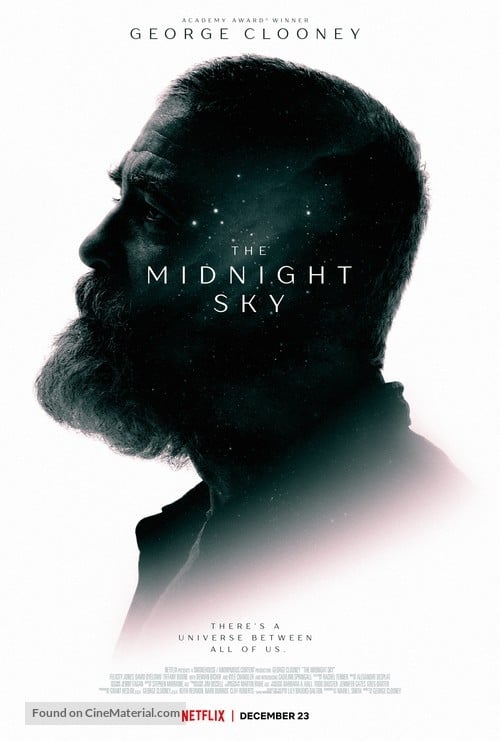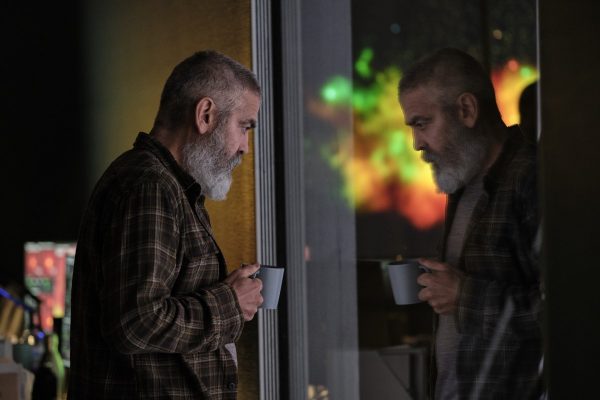The Midnight Sky, 2020.
Directed by George Clooney.
Starring George Clooney, Felicity Jones, Kyle Chandler, Demián Bichir, David Oyelowo, Tiffany Boone, Caoilinn Springall, Sophie Rundle, and Ethan Peck.

SYNOPSIS:
This post-apocalyptic tale follows Augustine, a lonely scientist in the Arctic, as he races to stop Sully and her fellow astronauts from returning home to a mysterious global catastrophe.

George Clooney returns to the black canvas of space, having previously suffered an existential crisis under the command of Steven Soderbergh, and been flung around in sweaty-palmed fashion by Alfonso Cuaron. This time he’s in charge of his own mission, adapting Lily Brooks-Dalton’s Good Morning, Midnight for the Netflix dollar, and in doing so creates an identikit Sci-Fi film that’s more Space 101 than 2001.
The opening fifteen minutes are full of the kind of slow-drip intrigue that the rest of the movie cannot deliver on. Clooney’s Augustine Lofthouse is glimpsed painfully shuffling around an abandoned research facility in Antarctica, against the backdrop of an outside world which has suffered a fate only hinted at as “the event” by an on-screen title. Through brief flashbacks we learn why he is suffering, and then watch as he self-administers blood-transfusions, and sits in front of rows of monitors. You know something bad has happened, but you’re unsure what, or why he remains as this spectre of isolation.
Running parallel to this story is that of the crew of a spaceship returning from a two-year mission to discover whether a planet is able to sustain human life. Unfortunately they’re unaware of whatever fate has befallen Earth, and the two narratives begin to entwine as Augustine traverses the harsh landscape in order to reach a communication tower and make contact.
It’s the gaping void in quality between the two threads that makes The Midnight Sky such a slog. Any time we’re with Clooney and his insular astronomer there’s a greater level of interest than when we peer into space. Up there its science-fiction bingo and a wasted stellar ensemble. When something inevitably goes wrong and a set-piece ensues in which Clooney borrows CGI aesthetics from his Gravity playbook, a character has to make their first space-walk in order to do repairs. You can circle the square on your card marked ‘Red Coat’ and wait for your eyes to roll into the back of your head.

Literally everything here has been done before, from the slingshot manoeuvre in order to get home (Apollo 13, The Martian), to the heartbreaking message from a loved one which was sent before the world began to burn (Interstellar). You might forgive the tropes had the characters not been as bland as the collective on offer here, but they’re all lumbered with such uninteresting and utterly predictable back stories and personalities that you just don’t care, which for an end-of-the-world narrative is unforgivable.
Back amongst the swirling snow and frozen facial hair of the tundra, Clooney at least gives it his all, especially when it comes to the physicality of his performance. However, the emotional element of his story is hamstrung by the predictability of it all. Anyone who watched the trailer could probably piece together the relevance of his young travelling companion, and even then you’ll be able to figure out what’s going on after one of the numerous flashbacks to his past. It completely undermines the intended impact of the ending, which wants to stick a McConaughey talking to Murph style emotional wallop, but misses the mark by some distance, despite the best efforts of Clooney and Felicity Jones.
Much better when its feet are on terra-firma rather than dancing among the oh-so-many clichés in the stars, The Midnight Sky is by no means a bad film, it just feels like an echo of infinitely superior genre predecessors and influences.
Flickering Myth Rating – Film ★ ★ / Movie ★ ★
Matt Rodgers – Follow me on Twitter













